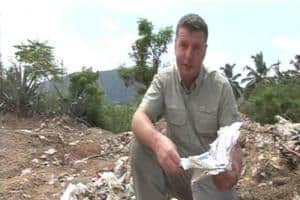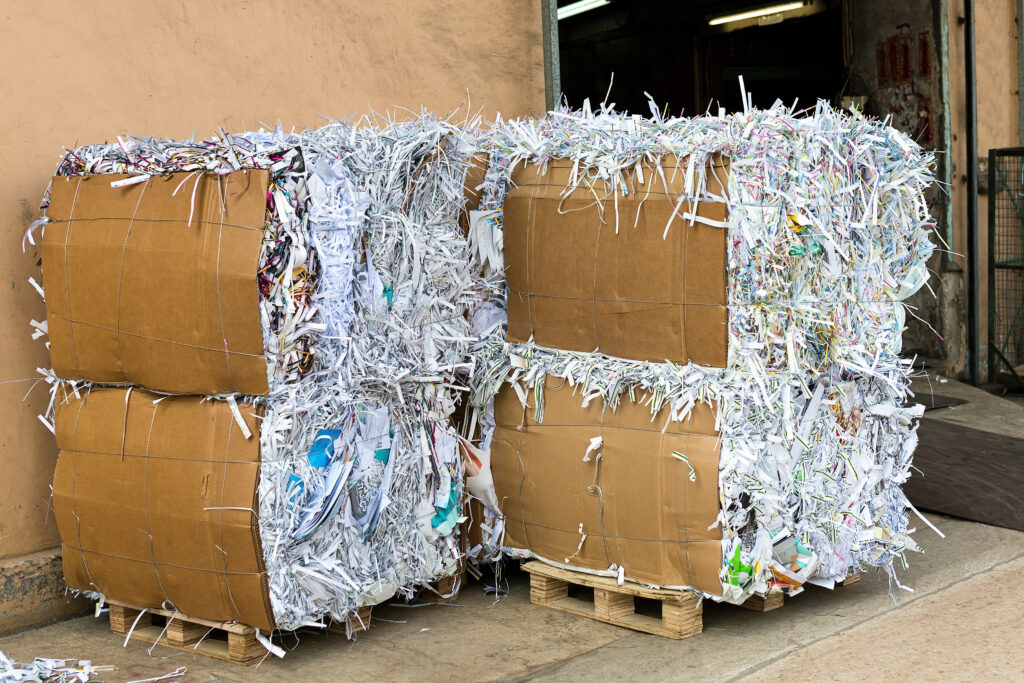In articles publicising the programme, published in the Mail on Sunday and the Sunday Mirror, Mr Jordan stated that while in India he saw a 30 foot deep pile of refuse and recyclables, which included post from areas covered by Tendring district council in Essex, Wellingborough district council in Northamptonshire, Wakefield district council in Yorkshire and Leicestershire county council.
Newspaper bales
Ron Humphreys, a waste paper expert and managing director of AbitibiBowater on Deeside, is reported as checking bales of newspapers taken to him by the programme-makers and finding waste within the bales. Mr Humphreys said today that the “bales came from one of a number of third-party brokers who professed to selling baled news and pams”.
No details have yet been released about which sorting plants or exporters of material are involved with the material featured by the programme and the Environment Agency has asked for the programme-makers to contact them if they have information about illegal exports.
Questions being raised ahead of the programme by industry experts have included the age of the material involved and the fact that a number of materials recycling facilities and sorting plants have changed hands in recent years.
Councils
Some of the local authorities which are expected to be featured in the programme have already responded.
Joanne Roney, chief executive of Wakefield district council, said: “Wakefield council does not collect paper, plastic bottles and textiles together. The contractors who deal with sorting these materials are all independent of each other and generally based in different areas of the country. Paper and card are collected from kerbsides and household waste recycling centres.” She added that the paper was sent to Shotton Paper Mill in Cheshire.
“We cannot understand how any waste from Wakefield has ended up in India. We are clearly concerned about these allegations in the Tonight programme and will investigate further,” she added.
Tendring district council said that it sent its waste to a licensed waste collector, who in turn deliver it to a MRF and the council checks that it is sending it to licensed areas. The council declined to comment further until after it had seen the content of the programme.
Meanwhile, Leicestershire county council said that plastics and cans collected by the council have been sent to new contractors since April 2008. It is expected that the material concerned will have been sorted prior to April 2008 – before this date the county council said it sold recyclable materials to a “variety of companies” but maintained that all parties were located within the UK and it operated in accordance with the relevant legislation.
A spokesman for the Environment Agency said: “We don't believe containers of mixed waste are going out now. Having said that there is no room for complacency, if we want to recycle more than we are really dependent on these international markets and it's incumbent on all of us to make sure that what we are throwing away and then what is subsequently exported is of the right standard and is wanted by the receiving countries, otherwise basically we set back UK recycling many, many decades.”
“We've asked the programme to share their findings with us so that we can take further action if appropriate,” he added.
Duty of Care
With the knowledge that the programme and newspaper reports were imminent, the Local Government Association issued a statement last week saying that companies should endeavour to ensure the waste they handle is passed on to an authorised handler and companies should also reveal the end source of where they sell their recyclable material (see letsrecycle.com story).
One senior waste management industry source told letsrecycle.com today that the LGA was ignoring the work being done by companies to keep councils informed with regards to where recyclables were eventually sold.
He said: “I've worked for a number of companies large and small and in every case the relevant local authorities receive a cradle to grave report on what happens to their material and where it ends up. This has been made a lot easier with the introduction of the Annex vii bought in by the EA, which lists amongst other things the end user.”
He added: “The local authority has a duty to check this at any time. I get a bit fed up with some people always blaming the private sector when in reality some local authority's don't even bother to follow up their duty of care.”










Subscribe for free